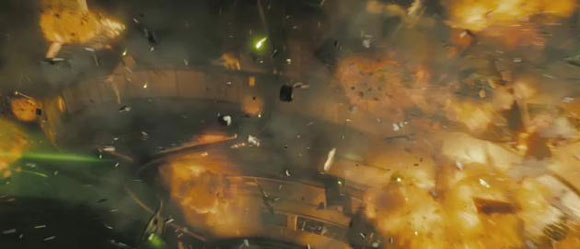The latest movie in the Star Trek pantheon is a thrilling action adventure in outer space. Cinema audiences will get their adrenaline rush, but action-packed science fiction with laser destruction and theatrical explosions are common fare, and other than directing a box-office hit, the heralded J.J. Abrams has not put his name to a distinguishable film. While following the typicality of so many other action-adventure films, a familiar theme is missing from the movie Star Trek.
In the 1960s, the TV series Star Trek presented viewers a progressivist future wherein humans had overcome poverty, racism, and war. Some progressives even considered Star Trek to be a pareconist future. ((Matt Grinder, “Unofficial Economics of Star Trek.”)) This is, however, decidedly not the case as a starship is a hierarchical and not an egalitarian workplace.
Many of the episodes focused around ethical challenges that confronted space explorers of the twenty-third century. Viewers saw captain James Kirk and Mr. Spock grappling over whether to arm one side in a conflict against another side that were being armed by an enemy race (“A Private Little War”). In “A Taste of Armageddon,” Kirk advocated non-violence:
We’re human beings with the blood of a million savage years on our hands. But we can stop it. We can admit that we’re killers; but we’re not going to kill today. That’s all it takes: knowledge that we’re not going to kill […] today…
Episodes dealing with moral dilemmas continued into the twenty-fourth century. In Star Trek: Voyager’s “Death Wish,” captain Katherine Janeway is asked to consider an individual’s request for asylum so he may commit suicide. In “Scorpion,” weapons of mass destruction are abhorred.
Star Trek: Voyager’s “The 37s” explored solidarity. The crew of Voyager was given the choice of staying on a habitable planet, which appeared much like earth and had, in fact, been “seeded” with humans from Earth. The choice was an important one because if too many crew members elected to stay on the planet and start a new life, then the remaining crew that wished to return home might be insufficient in number to fly Voyager.
During the early voyages of the starship Enterprise, the episode “Bound” explored the issue of obedience on the most recent of the Star Trek TV runs: Star Trek: Enterprise.
Star Trek: Deep Space Nine’s “The Way of the Warrior I” is an antiwar episode. The Klingon warrior Lt. Commander Worf stands by the principle: “Starfleet will not participate in an unprovoked invasion.”
In the Star Trek: The Next Generation episode “The Drumhead,” a struggle takes place over protecting human rights in the face of fear.
There is little difference in the substance of the current film Star Trek and the previous film Nemesis. The disappointing Nemesis was directed by Stuart Baird who, like Abrams, was unfamiliar with the Star Trek universe. Nemesis was an action-adventure good guys-bad guys flic with a villain from the Romulan Empire, but it did raise the specter of cloning technology gone awry.
The latest Star Trek is a story of vengeance, of mass murder by the Romulan Nero who searches the stars for Mr. Spock in a spaceship that looks like an agglomeration of bull kelp. The film was replete with typical musical flourishes designed to add oomph, but these were so overbearing that this viewer was irritated and distracted from the on-screen action. The storyline even warped to the extent that Vulcan children revealed racism toward the mixed-blooded Spock — a highly illogical behavior.
So why the absence of a progressivist theme in Star Trek?
Is it just applying a successful money-making formula to draw in fans? Probably.
Has Star Trek departed from its early progressivist visions? With sufficient hype — and, after years of dormancy, Star Trek was ripe for hyping — the storyline of phasers firing, photon torpedoes launching, weapons-of-mass-destruction destroying, and planets exploding is a formulaic box-office draw. Nonetheless, one movie review lamented the “mere 3 explosions, [as] an unconscionably low amount for such a big movie.” ((Kyle Buchanan, “Summer Movie Explosion Preview Spectacular!” Movie Line, 13 April 2009.))
Writing and producing a script that appeals to the moviegoer’s intelligence is much more challenging but maybe less lucrative, and it is profit that keeps Hollywood movies being made — not critical accolades.
As a movie franchise, it appears that Star Trek has gone fully for fast-paced thrills to please moviegoers. The numbers indicate the film is a box-office success and has guaranteed a second movie with the same crew.
There is talk also of a Star Trek TV series being revived as well.
Action films that keep the viewer in perpetual suspense are highly entertaining, but some viewers yearn for more. This writer hopes that any future TV series will preserve the dynamism but also engage its audience with episodes exploring, for example, the depths of humanity, moral dilemmas surrounding the Prime Directive and cherished principles of the Federation, and progress toward egalitarianism in the future. In this way, Star Trek might recapture the progressivist attraction of the earlier series and appeal to the sanguinity of many viewers.











